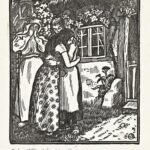Choosing the Unconditional Road
Ruth determined to go to Israel with Naomi, and to stay by her come what may.
Ruth and Naomi embrace
Art by Lucien Pissarro (1863-1944)
Ruth determined to go to Israel with Naomi, and stay by her come what may. Rather than asking for something, Ruth was offering herself, in all faithfulness, no matter the consequences. There were no contingencies in her offer. She gave herself simply, whole-heartedly. Why?
Choosing the Unconditional Road
A friend of mine loves God, but wonders about the wisdom of His dealings with her. She says everything is okay, she’s even ready to go to the mission field, except that she doesn’t have a husband. Or a child. How could God leave these important people out of her life and maybe even out of His plan for her? She’s been waiting for a long time and nothing seems to change.
Our culture is full of the voices of people making demands. Abortion rights activists want “Abortion on demand with no apology.” The National Rifle Association lobbies for an unlimited right to keep and bear arms. Animals are championed by those who are eager to stand up for their rights. We seem to think that a posture of insistence is the only posture.
But something deep is revealed when we habitually take a demanding attitude either toward people or toward God. What you say shows who you are.
Jesus said it’s out of the abundance of the heart that the mouth speaks. A complaining mouth suggests a complaining heart. As the Scripture shows us, a complaining heart is an unbelieving heart, out of tune with God and His way.

Jesus said it’s out of the abundance of the heart that the mouth speaks. A complaining mouth suggests a complaining heart. As the Scripture shows us, a complaining heart is an unbelieving heart, out of tune with God and His way.
God turns the tables on our tendency to insist on our rights. Take His description of His own, beloved Son. Jesus did not think His equality with God “something to be grasped [at],” but “made Himself of no reputation and took on Himself the form of a servant” (Philippians 2).
We are urged in the same passage to be like Jesus, to take up the same attitude He had. He was rightful heir to all God’s glory and power, but didn’t insist on His rights. He bought our salvation by becoming a servant to us.
In the Bible’s Book of Ruth, Ruth the Moabitess faced much the same problem the friend I mentioned is facing. She found herself a childless widow, with no male protector of any kind. Her mother-in-law, Naomi, told Ruth to go back to her father’s home: that would be best if she hoped to remarry and start her life again.
But Ruth determined to go to Israel with Naomi, and stay by her come what may; “Where you go I will go and where you stay I will stay. Your people will be my people and your God my God” (Ruth 1). Rather than asking for something, Ruth was offering herself, in all faithfulness, no matter the consequences. There were no contingencies in her offer. She gave herself simply, whole-heartedly. Why?
The key to her attitude is in the blessing Naomi’s kinsman Boaz gives her when he finds her gleaning grain in his field: “The Lord recompense thy work, and a full reward be given thee by the Lord God of Israel, under whose wings thou art come to trust” (Ruth 2).
She trusted the Lord to the point of abandoning her ancestral gods, all that she had known and all that she had been. It was God she wanted, and she obtained Him. There was nothing in Naomi’s return to Israel that held any particular promise for Ruth, but as Boaz saw, it was to God that Ruth entrusted herself.
In the end, Ruth received from the Lord all that she lacked when she set out from Moab with Naomi, but the Lord did even more than satisfy her personal need. Boaz became her husband, she became “better than seven sons” to Naomi (Ruth 4), and bore a son to be an heir to Boaz and Naomi’s heirless house.
But best of all, Ruth became ancestor to King David, and through David, ancestor of Jesus the Messiah. Because Ruth sought God first, God made satisfying her need an occasion for meeting the needs of others and advancing His plan.
How God looks for hearts that are fully yielded to Him! (II Chronicles 16). He longs for us to share in His great work, to know His joys.
Giving up your “rights” may not make good political sense, but it is the only spiritual beginning going. Paul says “I urge you brothers, in view of God’s mercies, to offer your bodies as living sacrifices…” (Romans 12).
May we not abide in the shadowlands and swamps of our own demands, but offer the Lord an unconditional surrender.
Marena Fisher, Graduate ‘91
© 1995 The Yale Standard Committee

